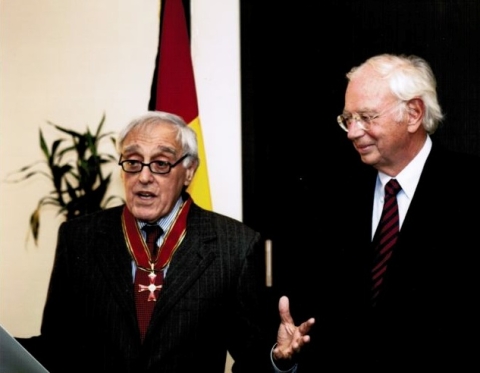

Below are Frank Loy's comments from his speech after winning the Commander's Cross of the Order of Merit of the Federal Republic of Germany:
Comments on the Occasion of the Award of the Commander’s Cross of the Order of Merit of the Federal Republic of Germany
The Residence of the German Ambassador
Washington, DC, November 2, 2010
I am, of course, both proud and grateful for this honor. Grateful to President Wulff and to you, Klaus [Scharioth]. And am particularly pleased to be able to receive the award in the presence of my family.
It isn’t clear how I merited such an honor. I looked to see who had won this award in past years, and found among them major political figures, such as Richard von Weizsaecker, Egon Bahr, and Otto Schily; famed names of the German stage and screen; theologians; Nobel prize winning scientists; wildly successful entrepreneurs; etc. All important figures in the life and story of Germany. I didn’t seem to fit. Then I did see that the list includes Max Schmeling and Franz Beckenbauer -- and I realized that this was probably an award for my athletic performance. They wished to honor a tennis player but somehow couldn’t find Boris Becker.
Let me ruminate for a moment on the fluke of history that lead us to this moment. If that history had played out differently I would today be a middle-class German burgher, most likely at this very moment on my way to the Hofbrauhaus in Munich for a beer. After all, both my father’s and mother’s families lived in Bavaria for generations. The records we have go back to the middle of the 18th century, and show that they all lived in Nuremberg or Fuerth until the 1930s, when we moved to the countryside, near Munich.
The families were very proud Germans. Totally assimilated in Germany’s business and professional life. Walt's and my father was an officer in the German army in World War I. My own first memories of Germany are of a bucolic paradise, the country house in the peaceful village of Rottach am Tegernsee, to which my father retired.
There was then no reason to envision a future for me other than a life in business, following my father's footsteps, or perhaps in the law, following the career of my maternal grandfather, who was an Oberlandesgerichtsrat in Bavaria.
It was not to be. For we were also Jewish. Not in any religious or cultural sense. We never set foot in a synagogue, and our most important holiday was Christmas. But in the Hitlerian sense we were Jewish, and so we fled, leaving behind – for me -- wonderful memories, and, I might add, most of our assets.
Then everything changed. We grew up totally American, in every sense. In language, in attitude, in loyalty. All three brothers served in the American army. But in one important sense little changed. For we never lost our love and admiration for Germany and matters German.
Walt became the head of the Miami German American Business Chamber, and I became the President of the German Marshall Fund of the US, which today is so well led by Craig Kennedy. Today, as you noted, I continue to nurture my German ties as chair of the Arthur Burns Fellowship Program, and as a member of the board of Jack Janes' American Institute of Contemporary German Studies.
During this time, of course, a much more interesting and important development was taking place in Germany. Germany undertook to reestablish it's democratic institutions, its status as a healthy civil society. In that endeavor it has succeeded beyond anything that could have been anticipated. It has become a vibrant democracy, with a strong commitment to the rule of law. In many ways it is a model for other industrialized nations struggling with contemporary pressures: rising economic expectations, aging populations, rising immigration, and the consequences of globalization.
And then in 1990 it achieved a peaceful and, all things considered, remarkably successful ending of its artificially divided status. It is today a true world leader, and a hugely important ally of the United States.
During a part of this period – during the last 30 years -- I was privileged to play a small part in nurturing the continually deepening mutual understanding of these two countries and societies. To me, their continued collaboration is the best guarantee we have for a peaceful, prosperous world.
So we come together here today not so much to celebrate an award by the President of America’s great ally to an American with my special history. Rather, to celebrate a heartening and important 20th (and 21st) century story of reconciliation – and I am proud and grateful to have been a part of it.